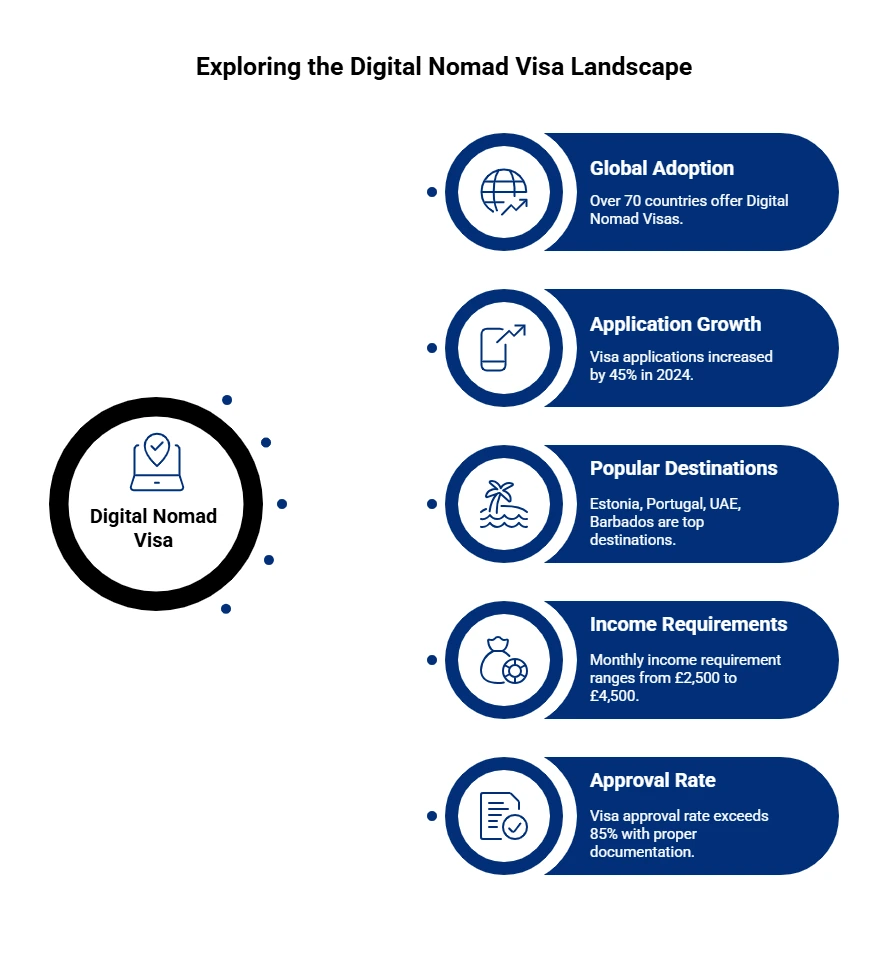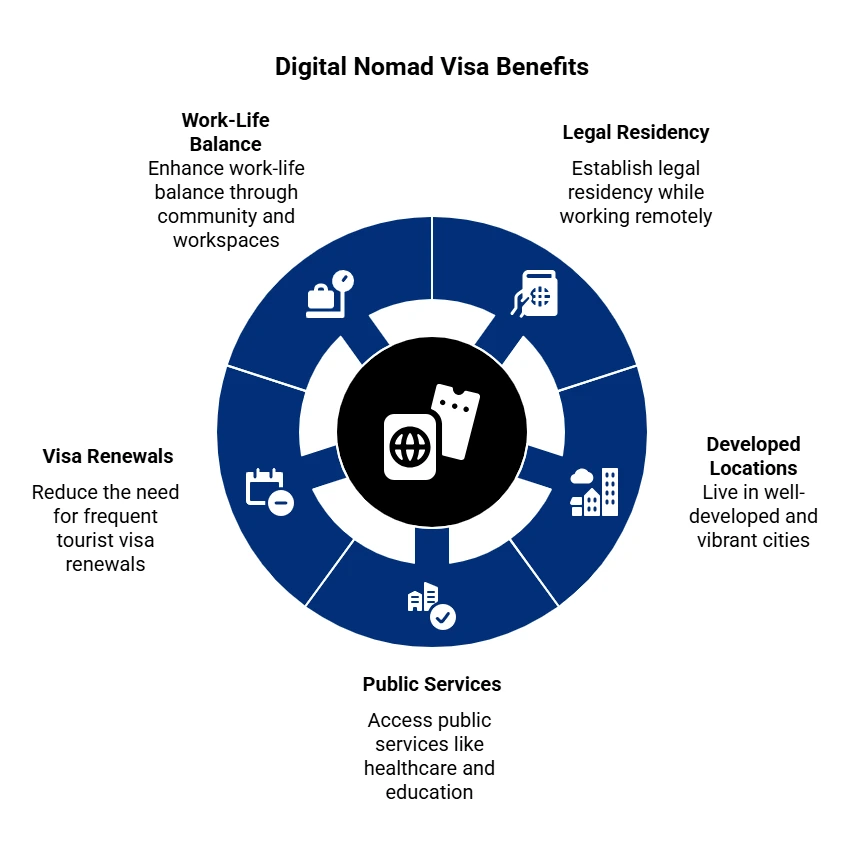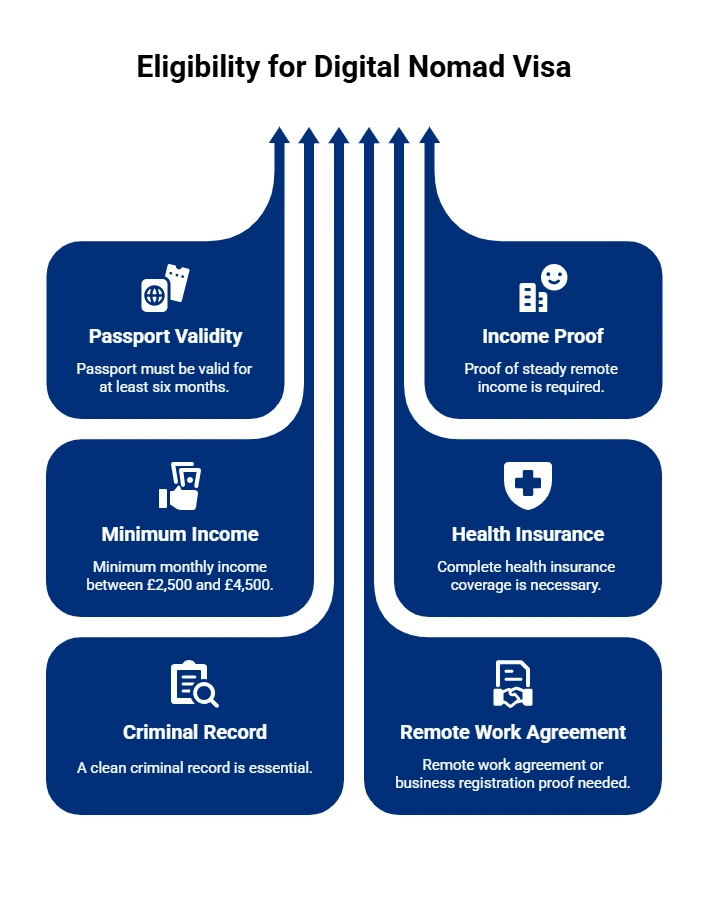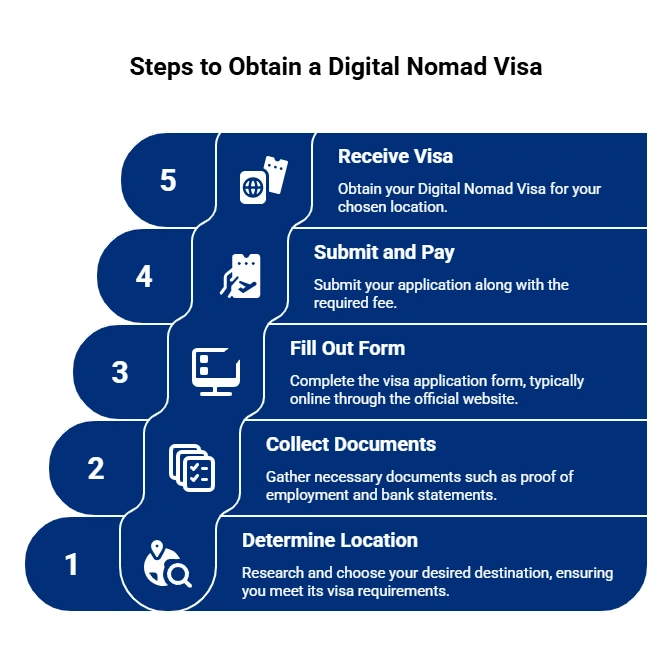A Digital Nomad Visa lets people work remotely in another country. It's a good option for those who want to experience new cultures and work outside their home country.

*Want guidance to apply for Digital Nomad Visa? Sign up with Y-Axis for comprehensive support with the process.
A Digital Nomad Visa allows remote workers, freelancers, and entrepreneurs to live in a foreign country while continuing to work for an employer or business based outside that country. It offers a legal and flexible pathway to stay abroad for extended periods, typically ranging from 6 months to 5 years, depending on the host country.
*Looking for assistance to apply for work abroad? Y-Axis is here to support you with the process.
The benefits of a Digital Nomad Visa are given below.

*Want guidance to apply for overseas immigration? Let Y-Axis support you with the process.
The types of remote workers who may apply:
Countries provide nomad visas that differ a lot. The various types of Digital Nomad Visa are:
Note: Many countries provide special residency gains or quick ways to get visas for the long term or local business visas.
To qualify for a digital nomad visa, most countries require you to:

The general documents required for a digital nomad visa is as follows:
| Document | Description |
| Valid Passport | Must be valid for at least 6 months |
| Employment Proof | Remote job contract or proof of freelance income |
| Bank Statements | Showing stable income (e.g., €2,400–€4,000+/mo) |
| Health/Travel Insurance | Coverage for entire duration of stay |
| Accommodation Proof | Rental agreement or booking confirmation |
| Police Clearance Certificate | Recent background check (usually within 6 months) |
The step-by-step application process for a digital nomad visa is as follows:
Step 1: Choose your destination based on visa rules and eligibility.
Step 2: Fill out the visa application (typically online).
Step 3: Upload required documents and income proof.
Step 4: Pay the visa fee as outlined by the host country.
Step 5: Attend biometrics or interview, if needed.
Step 6: Receive your visa decision (processing time varies).
Step 7: Enter the country and register locally, if applicable.

| Country | Monthly Income Requirement | Visa Duration |
| Spain | €2,400+ | 1–5 years |
| Portugal | €3,280+ | 1–2 years |
| Costa Rica | $3,000+ | 1 year |
| Kenya | $55,000/year | 1 year |
| Estonia | €3,504+ (annual) | 1 year |
Note: Income thresholds are approximate and subject to change. Always check with the host country’s immigration authority.
Detailed information about the costs and fees for Digital Nomad Visa is given below.
| Cost Category | Estimated Range (in GBP) |
| Visa Application Fee | £200 – £2,000 |
| Health Insurance | £50 – £150 per month |
| Police Clearance Certificate | £20 – £100 |
| Document Translation/Notarisation | £30 – £200 per document |
| Income Proof (not a fee) | Typically £2,500 – £4,500/month |
| Renewal or Extension Fees | £150 – £1,000 |
Detailed information about the processing times for Digital Nomad Visa is given below.
| Region / Country Type | Standard Processing Time |
| Fast-track countries | 5 to 15 working days |
| Average processing countries | 3 to 6 weeks |
| High-volume applications | 6 to 12 weeks |
| With Priority or Express Service | 3 to 7 working days |
| With Incomplete or Additional Checks | Up to 3 months or more |
Nomads may need to consider the following, which varies depending on their host country:
Many digital nomad programs permit dependents to join, given certain requirements are satisfied:
Applications might be rejected for these reasons:
Giving correct, full, and organized papers can raise the chance of approval.
Living abroad with a nomad visa usually provides:
Y-Axis offers complete assistance to remote workers pursuing digital nomad visas.
Our services include:
Seeking to begin working remotely from a different location? Obtain individualized help and expert advice now.
There following list of countries around the world offer Digital Nomad Visas easily. They have a simple process to make a Digital Nomad Visa application with a faster processing time.
If you enter the UK as a Standard Visitor, you cannot bring dependents on that status unless they qualify independently themselves. However, if you apply on a work visa, such as Skilled Worker or Innovator Founder, your partner and children under 18 (and in dependent circumstances) may join you, provided you meet eligibility and evidence requirements
Visitor visa holders are not entitled to free NHS care and can be charged for treatment. There is no health insurance requirement for visitor or business visas, but private travel or health insurance is strongly recommended to cover emergencies or treatment costs during your stay
Yes. Regardless of visa type, including Standard Visitor or longer-term work visas—you are legally permitted to rent private accommodation, as tenancy is a civil contract governed by UK law. Visitors must show the property is for temporary use, while those on work visas can sign typical residential leases. Income from UK-based employment or public funds is restricted for visitors, but renting property is allowed under immigration rules.
No. A Standard Visitor visa does not lead to settlement or permanent residence. For work or business routes like the Skilled Worker visa, ILR is typically available after 5 years of continuous lawful residence and meeting salary and other requirements. For the Innovator Founder visa, ILR is possible after 3 years with continued endorsement and meeting performance, language, and Life in the UK test criteria
Anyone who meets the following criteria is eligible for a Digital Nomad Visa:
The concept of a Digital Nomad Visa is to attract skilled individuals who want to do remote work for a specific period while traveling in a foreign country. The visa has been launched by many countries to reduce illegal migration and have a legal right to work while traveling. Digital Nomads are often required to satisfy the eligibility criteria, such as working for an employer or a corporation registered out of the host country.
There are certain countries that offer Digital Nomad Visas without paying fees, and they are as follows:
The benefits of Digital Nomad Visas are as follows:
A digital nomad can work remotely with a Digital Nomad Visa for a period of 1 year in a foreign country. Upon eligibility, the Digital Nomad Visas can be extended for a period of 2 years. However, it is mandatory for digital nomads, in most cases, to work for a foreign employer while staying in a host country.
You can do the following work with a Digital Nomad Visa:
You are eligible to work remotely in any industry with a digital nomad visa. The most common occupations digital nomads can work in are as follows:
The following table lists the differences between a Tourist Visa and a Digital Nomad Visa:
| Aspects | Digital Nomad Visa | Tourist Visa |
| Documents | Have to submit a long list of documents as requested | Have to submit only few documents |
| Processing Time | Takes from weeks to months to process an application | Takes only few weeks to process an application |
| Validity | It has a validity of more than 90 days | It has a validity of around 30 days |
| Purpose | There is permission to travel and work simultaneously | There is only permission to travel |
| Requirements | You must have employment to be considered for this visa | You are not required to be employed to be considered for this visa |
Yes, though the Digital Nomad Visas generally allow you to stay for a period of one year, some countries permit Digital Nomad Visa holders to convert to permanent residency. The countries that issue nomad visas that lead to permanent residency are as follows:
A Digital Nomad Visa is a legal document permitting remote workers to live in a foreign country. They can work online for employers or clients outside of that country. This visa is suitable for freelancers, entrepreneurs, and remote employees. Unlike tourist visas, it allows longer stays (from 6 months to 2 years) and has fewer restrictions. Several countries now offer this visa to attract location-independent professionals who contribute to the local economy but do not take jobs from local residents.
To qualify, Digital Nomad Visa applicants must meet criteria such as:
Income criteria differ among countries, though most programs require evidence of a stable monthly income ranging from £2,500 to £4,500. Certain countries might accept proof of savings or long-term agreements. Typically, applicants must give 3–6 months of bank records, salary slips, or client agreements. Applying with dependents may raise the income requirement to accommodate added living costs.
The general documents required for Digital Nomad Visa are:
Some countries might also ask for proof of where you are staying, flight plans, or other forms.
The processing times for Digital Nomad Visa are given below.
| Region / Country Type | Standard Processing Time |
| Fast-track countries | 5 to 15 working days |
| Average processing countries | 3 to 6 weeks |
| High-volume applications | 6 to 12 weeks |
| With Priority or Express Service | 3 to 7 working days |
| With Incomplete or Additional Checks | Up to 3 months or more |
Yes, many countries with Digital Nomad Visas let you bring immediate family, like spouses and kids who depend on you. But, each country has its own rules for who can come, how to apply, and what papers you need. Usually, you'll have to show you make enough money to take care of your family while you're there. This often means you need to make more than if you were applying alone. Some countries give family members their own permits, while others include them on your visa. Make sure you look at the specific rules for the country you want to go to before you include your family in your application.
Yes, you need to pay taxes in the country where you get the Digital Nomad Visa from. You might need to pay taxes in the nation that gives you a Digital Nomad Visa. This depends on the country's tax rules and how long you stay. Many of these visa programs have tax breaks or specific rules for remote workers who don't make money from local jobs. Still, if you stay past a set time, often 183 days, you could become a tax resident. This could mean you have to pay local taxes. So, it's important to check the tax rules of the country or talk to a tax advisor before you move.
Yes, immigration rules in many countries allow you to apply for a Digital Nomad Visa while you are already abroad. A few countries want you to apply from your home country. So, ensure you can apply from within the country and that your current visa lets you stay there legally while they process your application.
Yes, you can extend your Digital Nomad Visa. Some countries permit Digital Nomad Visa holders to extend their stay for a few more months or years. Usually, you'll have to send in fresh documents that show you're still earning money, working remotely, and have current insurance. Keep in mind that extensions aren't guaranteed; they might have updated costs or new rules you must meet. It's best to read the visa program's guidelines for renewal details.
For digital nomads, some top countries include:
The tax implications of a digital nomad visa depend on the laws of the host country. Key points to consider include: